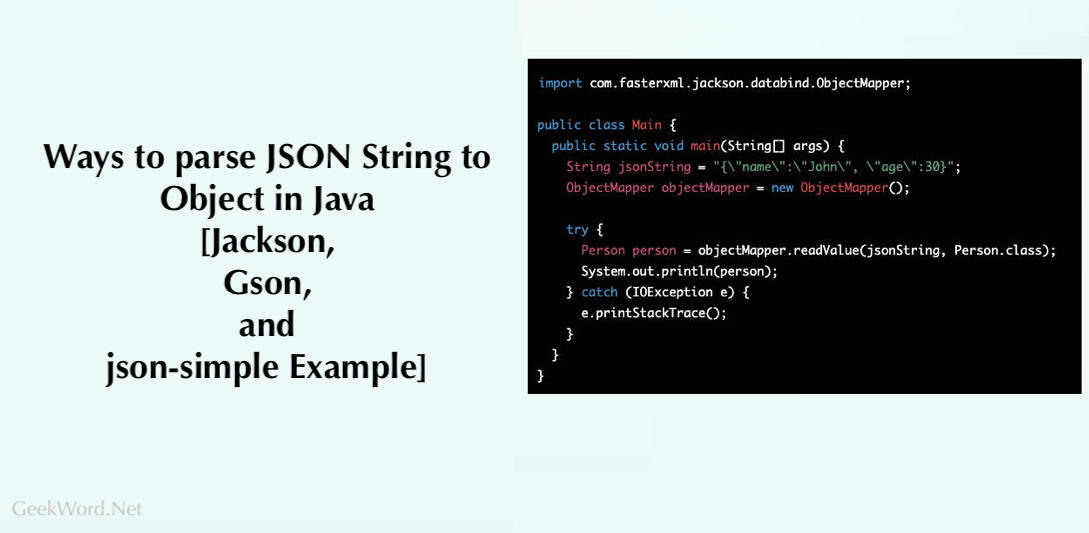Java web applications, especially those involving RESTful web services, often need to parse JSON messages to create Java objects like POJOs, such as an Order or a Book. Although the JDK does not offer a built-in API for parsing JSON, several open-source libraries can accomplish this task. Some popular options include Jackson, Gson, and json-simple, which provide simple and efficient ways to convert JSON strings into Java objects.
Contents
Parse JSON String to Object in Java?
To convert JSON strings to Java objects in Java, you can use JSON deserialization with one of the following libraries: Jackson, Gson, or json-simple. These libraries simplify JSON parsing and can be easily downloaded and integrated into your Java project to handle JSON data.
In Java, there are several libraries that can be used to parse JSON strings into objects. Three popular libraries are Jackson, Gson, and json-simple. Here’s an example of how to use each of these libraries to parse a JSON string into an object:
Read more:- Top 10 Microservice Design Patterns Examples & Principles:
1. Jackson:
First, add the following dependency to your Maven pom.xml or Gradle file:
<!-- Maven -->
<dependency>
<groupId>com.fasterxml.jackson.core</groupId>
<artifactId>jackson-databind</artifactId>
<version>2.13.0</version>
</dependency>// Gradle
implementation 'com.fasterxml.jackson.core:jackson-databind:2.13.0'Then, you can use the ObjectMapper class to parse the JSON string
import com.fasterxml.jackson.databind.ObjectMapper;
public class Main {
public static void main(String[] args) {
String jsonString = "{\"name\":\"John\", \"age\":30}";
ObjectMapper objectMapper = new ObjectMapper();
try {
Person person = objectMapper.readValue(jsonString, Person.class);
System.out.println(person);
} catch (IOException e) {
e.printStackTrace();
}
}
}2. Gson:
Add the following dependency to your Maven pom.xml or Gradle file:
<!-- Maven -->
<dependency>
<groupId>com.google.code.gson</groupId>
<artifactId>gson</artifactId>
<version>2.8.9</version>
</dependency>// Gradle
implementation 'com.google.code.gson:gson:2.8.9'Then, use the Gson class to parse the JSON string:
import com.google.gson.Gson;
public class Main {
public static void main(String[] args) {
String jsonString = "{\"name\":\"John\", \"age\":30}";
Gson gson = new Gson();
Person person = gson.fromJson(jsonString, Person.class);
System.out.println(person);
}
}3. json-simple:
Add the following dependency to your Maven pom.xml or Gradle file:
<!-- Maven -->
<dependency>
<groupId>com.googlecode.json-simple</groupId>
<artifactId>json-simple</artifactId>
<version>1.1.1</version>
</dependency>// Gradle
implementation 'com.googlecode.json-simple:json-simple:1.1.1'Then, use the JSONParser class to parse the JSON string:
import org.json.simple.JSONObject;
import org.json.simple.parser.JSONParser;
import org.json.simple.parser.ParseException;
public class Main {
public static void main(String[] args) {
String jsonString = "{\"name\":\"John\", \"age\":30}";
JSONParser parser = new JSONParser();
try {
JSONObject jsonObject = (JSONObject) parser.parse(jsonString);
Person person = new Person();
person.setName((String) jsonObject.get("name"));
person.setAge(((Number) jsonObject.get("age")).intValue());
System.out.println(person);
} catch (ParseException e) {
e.printStackTrace();
}
}
}In each example, replace Person with your desired object type and make sure that the object type has appropriate fields and getter/setter methods for the JSON properties.
Java Program for Converting JSON String to Object – Deserialization Example
In this example, we will use the Jackson library to deserialize a JSON string into a Java object:
- First, add the Jackson dependency to your project:
<!-- Maven -->
<dependency>
<groupId>com.fasterxml.jackson.core</groupId>
<artifactId>jackson-databind</artifactId>
<version>2.13.0</version>
</dependency>// Gradle
implementation 'com.fasterxml.jackson.core:jackson-databind:2.13.0'2. Create a Java class representing the object:
public class Person {
private String name;
private int age;
// Getters and setters
public String getName() { return name; }
public void setName(String name) { this.name = name; }
public int getAge() { return age; }
public void setAge(int age) { this.age = age; }
@Override
public String toString() {
return "Person{name='" + name + "', age=" + age + "}";
}
}3. Write the Java program to deserialize the JSON string:
import com.fasterxml.jackson.databind.ObjectMapper;
import java.io.IOException;
public class JsonDeserializationExample {
public static void main(String[] args) {
String jsonString = "{\"name\":\"John\", \"age\":30}";
ObjectMapper objectMapper = new ObjectMapper();
try {
Person person = objectMapper.readValue(jsonString, Person.class);
System.out.println(person);
} catch (IOException e) {
e.printStackTrace();
}
}
}This example demonstrates using the Jackson library to convert a JSON string into a Java object (deserialization). Replace Person with your desired object type, ensuring it has appropriate fields and getter/setter methods for the JSON properties
Know more:- DevOps Automation Tools
Parsing JSON in Java, it’s essential to keep the following points in mind:
- Choose the right library: Select a suitable JSON library for your project based on factors such as ease of use, performance, and project requirements. Popular libraries include Jackson, Gson, and json-simple.
- Data structure compatibility: Ensure that your Java object classes properly match the structure of the JSON data you intend to parse. Include appropriate fields, getter/setter methods, and constructors.
- Error handling: Properly handle exceptions and errors that may occur during JSON parsing, such as malformed JSON, missing keys, or type mismatch issues. Use try-catch blocks to catch any exceptions and take appropriate action.
- Null values and optional fields: Be prepared to handle null or missing values in the JSON data. Set default values or mark fields as optional when necessary.
- Data types: Ensure that data types in your Java classes correspond to those in the JSON data. For example, use
Integerfor integers,Doublefor floating-point numbers, andBooleanfor boolean values. - Nested JSON objects and arrays: When dealing with nested JSON objects or arrays, create corresponding Java classes or use appropriate data structures (e.g.,
List,Map, or arrays) to represent them. - Encoding: Be mindful of character encoding when parsing JSON data. JSON data is typically encoded in UTF-8. Ensure that your Java program uses the correct encoding when reading JSON data from a file or external source.
- Performance: Consider the performance impact of parsing large JSON data sets. Some libraries may be more efficient for specific use cases or offer options to optimize performance.
By paying attention to these aspects when parsing JSON in Java, you can ensure that your JSON processing is reliable, efficient, and easy to maintain.
Like to Know:- Difference Between : RANK(), DENSE_RANK() and ROW_NUMBER() in SQL
Conclusion
In conclusion, parsing JSON in Java is a common and vital task in web applications and RESTful web services. Although Java does not provide built-in support for JSON parsing, several robust and efficient open-source libraries are available, such as Jackson, Gson, and json-simple. These libraries facilitate JSON deserialization, converting JSON strings into Java objects. To successfully parse JSON in Java, it is essential to select the appropriate library, ensure data structure compatibility, handle errors, consider data types, and manage nested objects and arrays. By following these best practices, developers can create reliable, efficient, and maintainable Java applications that handle JSON data effectively.

Experienced Web Developer with a demonstrated history of working in the internet industry. Skilled in PHP, WordPress, Mobile Applications, Laravel, OpenCart, CodeIgniter, and CakePHP. Strong engineering professional focused on the development of Technology.

